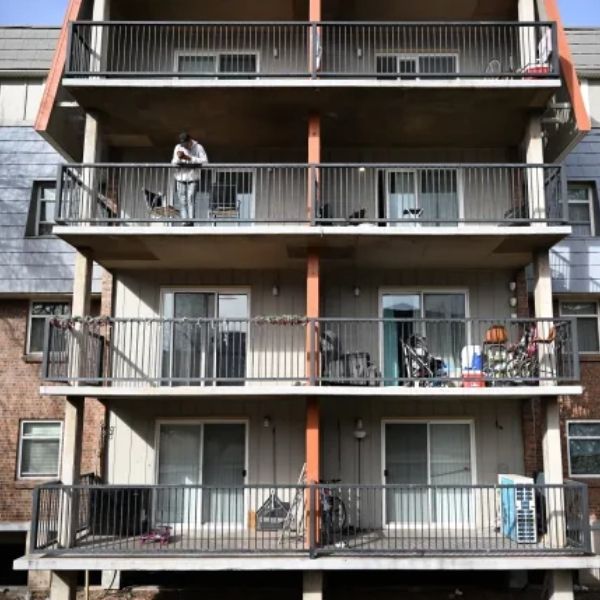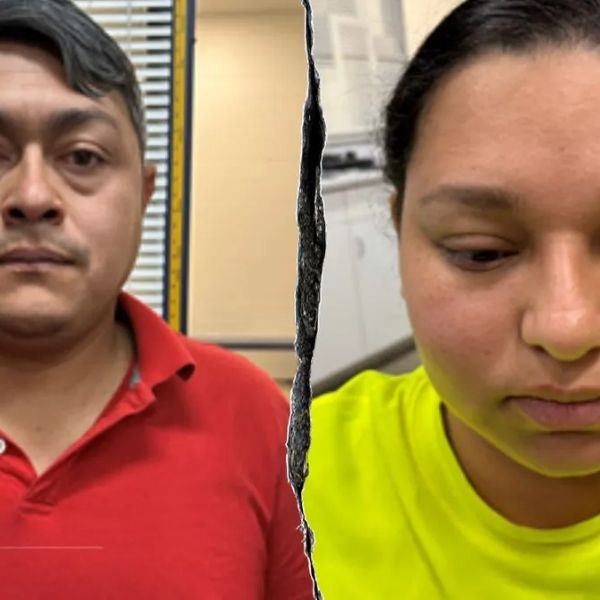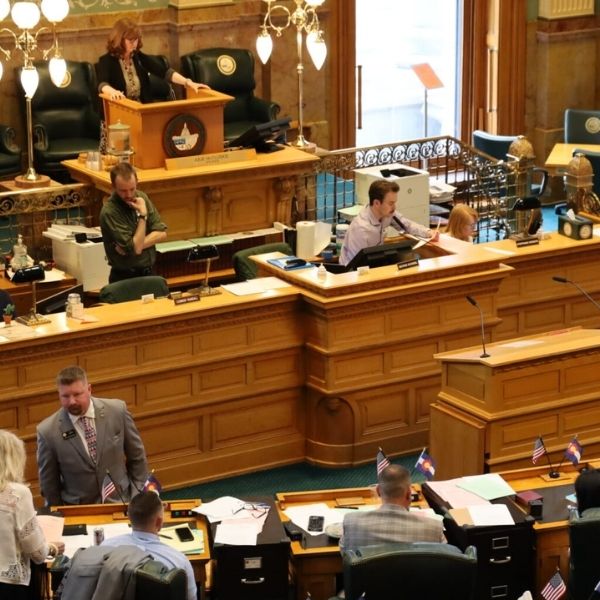Mary Collins panicked in March when loud banging echoed at her door in the Cedar Run Apartments, southeast Denver.
The 57-year-old renter had paid her rent in full, but she had fallen behind on utilities and other charges — pest control, trash, property taxes, sewer, and common-area upkeep.
Collins, who is disabled and cannot work, relies on a Section 8 Housing Choice Voucher. The Denver Housing Authority covers her entire rent and provides a utility allowance. But that allowance doesn’t cover the growing list of fees, leaving her constantly worried.
And the eviction threats keep coming.
“I’m so depressed,” Collins said. “I don’t know where to turn.”
Evictions Over Utilities Still Happen
Colorado law prohibits landlords from evicting tenants with vouchers or subsidies solely for unpaid utilities. Yet legal aid groups and housing advocates say landlords keep filing these cases.
Most renters don’t know their rights and lack attorneys, leaving them at a disadvantage against well-funded property managers.
Attorneys also argue it’s illegal to evict tenants for unpaid fees, though those cases are common too.
“It’s really frustrating and morally questionable,” said Zach Neumann, CEO of the Community Economic Defense Project. “Landlords know they can’t evict for this, but they file anyway — because tenants rarely have the resources to fight.”
Lawmakers who passed eviction protections fear landlords are ignoring the law. The Denver Metro Tenants’ Union is drafting new legislation to strengthen the statute.
“If a landlord cannot legally evict, they may not threaten it either,” said Eida Altman, the union’s director. “Threatening eviction over illegal fees looks a lot like extortion.”
Gelt Venture Partners, which owns the Cedar Run complex (recently renamed Meridian at Cherry Creek), declined to comment.
Rising Costs From “Junk Fees”
The federal Housing Choice Voucher Program helps low-income families, seniors, veterans, and disabled people pay rent. For renters without income, agencies like Denver Housing Authority cover the entire rent plus a utility stipend.
But “junk fees” — once common only in commercial leases — are piling onto residential renters. These extra charges can include:
- Boiler management fees
- Pest control fees
- Parking fees
- Package delivery fees
- Service fees that bundle other charges
Dozens of renters told The Denver Post that such fees have inflated their bills by hundreds each month.
Lawmakers responded by passing House Bill 1090, which bans several fees and requires landlords to disclose the full cost of renting upfront. It takes effect January 1.
Still, for voucher holders like Collins, these charges often exceed their subsidy allowance. At Meridian at Cherry Creek, tenants owe about $200 in fees and utilities monthly — far above what their vouchers cover.
Tenants Falling Into Debt
Another tenant, Latosca Hults, accrued over $600 in unpaid utilities and fees within four months. In October, management served her a demand for compliance, labeling “utilities” as a lease violation and grounds for eviction.
Her debt later ballooned to $2,000. Facing eviction and fearing homelessness, Hults spiraled into depression. At the last minute, Denver’s Temporary Rental & Utility Assistance program covered her balance.
“What if I lose my voucher? What if I become homeless?” she said. “What if it ruins my credit and I can never rent again?”
Legal Protections Ignored
Advocates insist Hults should never have faced eviction. House Bill 23-1095 bars landlords from removing tenants with subsidies “solely for nonpayment of utilities.”
Yet tenant unions and legal aid groups say landlords continue to flout the law.
“This is patently unlawful,” said Jack Regenbogen, deputy executive director of the Colorado Poverty Law Project.
State Sen. Nick Hinrichsen, who sponsored HB-1095, said the law was designed to ensure tenants who pay rent cannot be forced out over unpaid utilities.
But disputes remain. Some landlords claim they are not “housing providers” under the statute. Others argue unpaid fees justify eviction.
Neumann’s group contends state law only allows evictions for unpaid rent — not fees. But Joel Minor of Colorado Legal Services says only certain fees, like late charges, are explicitly exempt. Other types can still be used in court.
The legal gray area leaves tenants vulnerable.
Legal Gray Areas Keep Tenants at Risk
Colorado Legal Services often sees landlords pursue evictions over unpaid late fees. The problem, attorneys say, stems from the fact that Colorado’s eviction statutes never define the word rent.
“This is part of the problem,” said Jason Legg, co-founder and lead attorney for Justice for the People. “It’s confusing, especially for renters and those using vouchers to cover all or part of their rent.”
Zach Neumann, CEO of the Community Economic Defense Project, agreed, saying the lack of clarity leaves tenants vulnerable.
On the other side, Mark Hamrick of the Colorado Apartment Association argued that evictions are costly for landlords, not quick money grabs.
“It takes the average housing provider four months and about $10,000 to pursue an eviction,” he said. “No person on Earth is going to lose $10,000 over a $1,500 bill. That’s a huge guardrail.”
Hamrick added that many disputes hinge on the court and judge hearing the case. The question isn’t whether the tenant violated the lease, but whether unpaid utilities count as a material violation.
He also claimed that some renters misuse voucher money, pocketing funds meant for utilities.
“We as taxpayers are paying those folks to cover rent and utilities,” he said. “If they don’t use it for that, we as taxpayers have a dog in that fight.”
Tenants Face Courts Alone
The system, however, remains stacked against renters. Data from Colorado’s eviction dashboard shows that 81% of tenants go unrepresented in eviction proceedings. In contrast, 92% of landlords have attorneys.
Even worse, 85% of renters never file an answer to their landlord’s claims. This often leads to default judgments, allowing evictions and court-ordered debt without a legal defense.
Neumann said landlords rely on this imbalance.
“Even if the complaint is illegal or invalid, if tenants don’t show up with lawyers, they lose,” he said. “I don’t think landlords care — that’s the point. They believe they’re owed the debt and will use any means to collect it.”
For renters relying on subsidies, the consequences are devastating.
“Once you lose your voucher, you don’t just lose housing in the moment,” Neumann said. “You risk homelessness for the rest of your life.”
Living on the Edge
Both Mary Collins and Latosca Hults live in constant fear of eviction.
For Collins, the stress has taken a physical toll. She has lost weight, her hair has begun falling out, and insomnia keeps her awake most nights.
As she spoke to a reporter last week, she admitted she often wonders if she’ll return home to find a sheriff’s deputy at her door.
“I feel like I’m in la-la land,” Collins said. “This is like a dream.”

Katie is a senior who has been on staff for three years. Her favorite type of stories to write is reviews and features. Katie’s favorite ice cream flavor is strawberry.















Leave a Reply